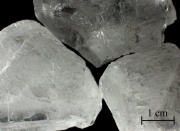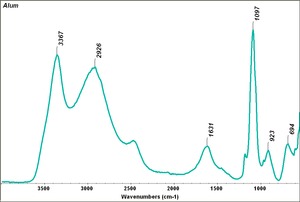Difference between revisions of "Alum"
Jump to navigation
Jump to search
| Line 2: | Line 2: | ||
== Description == | == Description == | ||
| − | A general name used for double sulfate salts of aluminum. The most common alums are double salts with potassium [KAl(SO<sub>4</sub>)<sub>2</sub>·12 H<sub>2</sub>O], sodium [NaAl(SO<sub>4</sub>)<sub>2</sub>·12 H<sub>2</sub>O] or ammonium [NH<sub>4</sub>Al(SO<sub>4</sub>)<sub>2</sub>·12 H<sub>2</sub>O]. All of these have some properties in common, such as they are water-soluble and have a sweet taste. Additionally they react as an acid by turning blue litmus paper to red. | + | A general name used for double sulfate salts of aluminum. The most common alums are double salts with potassium [KAl(SO<sub>4</sub>)<sub>2</sub>·12 H<sub>2</sub>O], sodium [NaAl(SO<sub>4</sub>)<sub>2</sub>·12 H<sub>2</sub>O] or ammonium [NH<sub>4</sub>Al(SO<sub>4</sub>)<sub>2</sub>·12 H<sub>2</sub>O]. All of these have some properties in common, such as they are water-soluble and have a sweet taste. Additionally they react as an acid by turning blue litmus paper to red. Alums have commonly been used as flocculants to clarify cloudy liquids. |
Uses for the specific types of alum salts include: | Uses for the specific types of alum salts include: | ||
* Potash alum, refers to [[aluminum potassium sulfate]]. It is a colorless, crystalline material used in the tawing of skins and as a mordant, or fixative, for many natural dyes. Potash alum is also used as the base for most [[Lake]] pigments. | * Potash alum, refers to [[aluminum potassium sulfate]]. It is a colorless, crystalline material used in the tawing of skins and as a mordant, or fixative, for many natural dyes. Potash alum is also used as the base for most [[Lake]] pigments. | ||
| + | * Soda alum, refers to [[sodium potassium sulfate]]. In the US, it is was formerly used in double action baking powder | ||
* For papermakers, the term alum, refers to [[aluminum sulfate]] or the mixture of aluminum sulfates obtained by treating pulverized [[bauxite]] with [[sulfuric acid]]. | * For papermakers, the term alum, refers to [[aluminum sulfate]] or the mixture of aluminum sulfates obtained by treating pulverized [[bauxite]] with [[sulfuric acid]]. | ||
| − | * In cooking, the term alum refers to [[aluminum ammonium sulfate]]. | + | * In cooking, the term alum refers to [[aluminum ammonium sulfate]]. In the Middle ages, it was commonly used as a whitener, extender and drying agent in wheat flour. |
* Other materials referred to as alum are [[ferric ammonium sulfate]], chromium sodium sulfate, and chromium ammonium sulfate. | * Other materials referred to as alum are [[ferric ammonium sulfate]], chromium sodium sulfate, and chromium ammonium sulfate. | ||
Revision as of 09:40, 16 March 2025
Description
A general name used for double sulfate salts of aluminum. The most common alums are double salts with potassium [KAl(SO4)2·12 H2O], sodium [NaAl(SO4)2·12 H2O] or ammonium [NH4Al(SO4)2·12 H2O]. All of these have some properties in common, such as they are water-soluble and have a sweet taste. Additionally they react as an acid by turning blue litmus paper to red. Alums have commonly been used as flocculants to clarify cloudy liquids. Uses for the specific types of alum salts include:
- Potash alum, refers to Aluminum potassium sulfate. It is a colorless, crystalline material used in the tawing of skins and as a mordant, or fixative, for many natural dyes. Potash alum is also used as the base for most Lake pigments.
- Soda alum, refers to Sodium potassium sulfate. In the US, it is was formerly used in double action baking powder
- For papermakers, the term alum, refers to Aluminum sulfate or the mixture of aluminum sulfates obtained by treating pulverized Bauxite with Sulfuric acid.
- In cooking, the term alum refers to Aluminum ammonium sulfate. In the Middle ages, it was commonly used as a whitener, extender and drying agent in wheat flour.
- Other materials referred to as alum are Ferric ammonium sulfate, chromium sodium sulfate, and chromium ammonium sulfate.
Synonyms and Related Terms
aluminum potassium sulfate; aluminum ammonium sulfate; aluminum sulfate; alum cake; alunite
Risks
- Alums will corrode metal
Resources and Citations
- Irene Bruckle, "The Role of Alum in Historical Papermaking", Abbey Newsletter, Volume 17(4), September 1993. Link
- R. J. Gettens, G.L. Stout, Painting Materials, A Short Encyclopaedia, Dover Publications, New York, 1966 Comment: aluminum hydrate: uses the term 'alum'
- G.S.Brady, Materials Handbook, McGraw-Hill Book Co., New York, 1971 Comment: p. 32
- The Dictionary of Paper, American Paper Institute, New York, Fourth Edition, 1980
- E.J.LaBarre, Dictionary and Encyclopedia of Paper and Paper-making, Swets & Zeitlinger, Amsterdam, 1969
- Matt Roberts, Don Etherington, Bookbinding and the Conservation of Books: a Dictionary of Descriptive Terminology, U.S. Government Printing Office, Washington DC, 1982
- Susan E. Schur, Conservation Terminology: A review of Past & Current Nomenclature of Materials, Technology and Conservation, Spring (p.34-39); Summer (p.35-38); Fall (p.25-36), 1985
- Wikipedia: Alum Accessed March 2025.
- Bill Bryson, ‘At Home: A Short History of Private Life’ Doubleday Publishers, London 2010.

